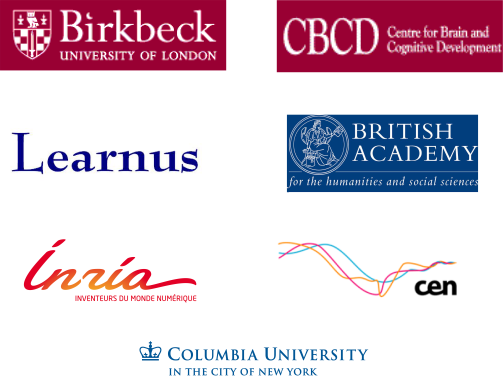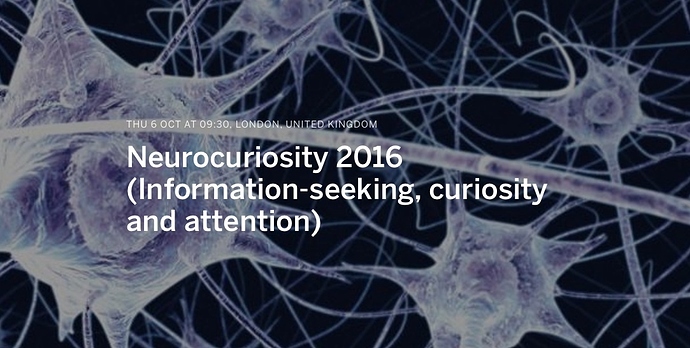The Centre for Brain and Cognitive Development (Birkbeck) hosted the second interdisciplinary symposium on information-seeking, curiosity and attention.
Date and Location
6-8 Oct. 2016, British Medical Association, London
Programme
Click below to download a full programme with titles.
Neurocuriosity Programme.pdf (416.6 KB)
Thursday 6th October: 9.00am-5.45pm
Topics
The past few years have seen a surge of interest in the mechanisms of active learning, curiosity and information seeking, and this body work has highlighted a number of highly significant questions regarding higher cognition and its development (for a recent review, see Tics13). One question is how subjects explore to build explanatory models of their environment, and how these models further constrain the sampling of additional information. A related question is how the brain generates the intrinsic motivation to seek information when physical rewards are absent or unknown, and how this impacts cognitive development in the long term.
The goal of the meeting is to foster a vigorous exchange of ideas among pre-eminent researchers who investigate these questions in neuroscience, psychology, developmental psychology, and computational modeling. The meeting will be single-track and include sessions on (1) behavior, (2) cognitive neuroscience, (3) computational modeling and (4) single neuron physiology.
Video Presentations
Behavioural and Cognitive Neuroscience
Jonathan Nelson, Max Planck Institute for Human Development, Germany
Go to abstract:
The Mathematics, Psychology, and Neuroscience of Information
Doug Markant, Max Planck Institute for Human Development, Germany
Go to abstract and video:
Constructing rules through active exploration: Evidence from human category learning
Romain Ligneul, Donders Institute for Brain, Cognition and Behaviour, Netherlands
Go to abstract:
The neural valuation of knowledge: from curiosity relief to epistemic surprise
Sid Kouider, ENS Paris, France
Go to abstract and video:
Neural dynamics of prediction, surprise and consciousness in infants
Matthias Gruber, Cardiff Univ., UK
Go to abstract and video:
The neurocognitive mechanisms of curiosity states on learning
Kou Murayama, Univ. Reading, UK
Go to abstract:
Curiosity as a complementary reward for extrinsic incentives
Jill O’Reilly, Univ. Oxford,UK
Go to abstract:
Control of entropy in internal models
Friday 7th October: 8.30am-6.00pm
Computation and Electrophysiology
Karl Friston, UCL, UK
Go to abstract and video:
Active inference and artificial curiosity
Gianluca Baldassarre, ISTC-CNR, Roma, Italy
Go to abstract:
Bio-inspired computational models of the development of attention skills: intrinsic motivations, goals, and learning
Peter Dayan, UCL, UK
Go to abstract and slides:
Exploration bonuses: Bayes and Beyond
Manuel Lopes and Pierre-Yves Oudeyer, Inria, France and Univ. Lisbon, Portugal
Go to abstract and video:
Diversity of forms and developmental functions of curiosity-driven learning
Kenji Doya, OIST, Japan
Go to abstract:
Design, inference and evolution of reward functions for robots
Wolfram Schultz, Cambridge Univ, UK
Go to abstract and video:
Risky Neurones
Andrew Bell, Univ. Oxford, UK
Go to abstract:
How Face Neurons contribute to Perceptual Decision Making
Laurence Hunt, UCL, UK
Go to abstract and video:
Reward-guided information search and choice in prefrontal cortex
Jacqueline Gottlieb, Columbia University, US
Go to video:
Day 2 General Discussion: Electrophysiology
Saturday 8th October: 8.30am-4.30pm
Development
Derek Bell, Learnus, UK
Go to abstract and video:
So what do I do in my lessons next week?
Katarina Begus, Central European Univ., Budapest, Hungary
Go to abstract, video and slides:
Active learners: Behavioural and neural mechanisms of selective social learning in infancy
Louise Goupil, ENS Paris, France
Go to abstract and video:
Developing a reflective mind: uncertainty monitoring, decision confidence and error detection in human infants
Lisa Feigenson, Johns Hopkins Univ., US
Go to abstract:
How Core Knowledge Drives Learning
Daphne Bavelier, Univ. Geneva, Switzerland and Univ. Rochester, US.
Go to abstract:
Learning to Learn: Lessons from Action Video Game Play
Alison Gopnik, UC Berkeley, US
Go to abstract:
When (and why) children are more open-minded than adults: Childhood as simulated annealing
Teodora Gliga, Birkbeck, University of London, UK
Go to video:
Day 3 General Discussion: Developmental Psychology
Lab demonstrations/tours took place after talks at 3pm
Organizers
Pierre-Yves Oudeyer (Inria, Bordeaux, France)
Teodora Gliga (Centre for Brain and Cognitive Development, Birkbeck College, London)
Jacqueline Gottlieb (Columbia University, NY, USA
Manuel Lopes (Inria, Bordeaux, France)
###Administrative Assistants
Candice Moore (Centre for Brain and Cognitive Development, Birkbeck College, London)
Nicolas Jahier (Inria, Bordeaux, France)
Funding
The meeting is generously sponsored by INRIA through a collaborative grant to the organizers’ laboratories (Pierre-Yves Oudeyer/Manuel Lopes at Inria Flowers’s lab, and Jacqueline Gottlieb at Columbia University, USA), and by a British Academy Award to Teodora Gliga from the Centre for Brain and Cognitive Development, Birkbeck.
Video Presentations and slides from Neurocuriosity 2014
Web site of the 2014 edition of the symposium
Organizations


